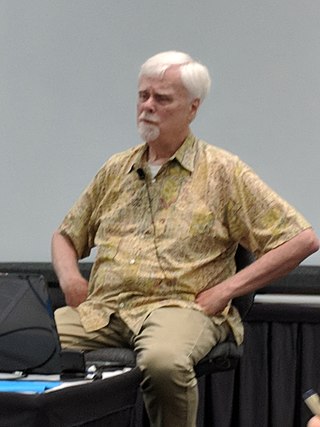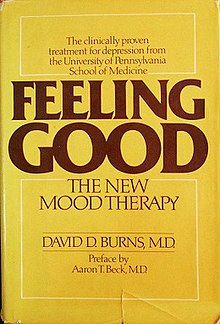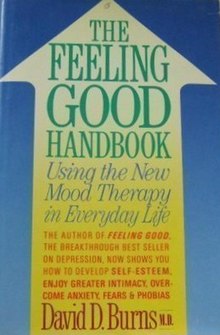
Cognitive behavioral therapy (CBT) is a psycho-social intervention that aims to reduce symptoms of various mental health conditions, primarily depression and anxiety disorders. Cognitive behavioral therapy is one of the most effective means of treatment for substance abuse and co-occurring mental health disorders. CBT focuses on challenging and changing cognitive distortions and their associated behaviors to improve emotional regulation and develop personal coping strategies that target solving current problems. Though it was originally designed to treat depression, its uses have been expanded to include many issues and the treatment of many mental health conditions, including anxiety, substance use disorders, marital problems, ADHD, and eating disorders. CBT includes a number of cognitive or behavioral psychotherapies that treat defined psychopathologies using evidence-based techniques and strategies.

Aaron Temkin Beck was an American psychiatrist who was a professor in the department of psychiatry at the University of Pennsylvania. He is regarded as the father of cognitive therapy and cognitive behavioral therapy (CBT). His pioneering methods are widely used in the treatment of clinical depression and various anxiety disorders. Beck also developed self-report measures for depression and anxiety, notably the Beck Depression Inventory (BDI), which became one of the most widely used instruments for measuring the severity of depression. In 1994 he and his daughter, psychologist Judith S. Beck, founded the nonprofit Beck Institute for Cognitive Behavior Therapy, which provides CBT treatment and training, as well as research. Beck served as President Emeritus of the organization up until his death.
A cognitive distortion is an exaggerated or irrational thought pattern involved in the onset or perpetuation of psychopathological states, such as depression and anxiety.
Cognitive restructuring (CR) is a psychotherapeutic process of learning to identify and dispute irrational or maladaptive thoughts known as cognitive distortions, such as all-or-nothing thinking (splitting), magical thinking, overgeneralization, magnification, and emotional reasoning, which are commonly associated with many mental health disorders. CR employs many strategies, such as Socratic questioning, thought recording, and guided imagery, and is used in many types of therapies, including cognitive behavioral therapy (CBT) and rational emotive behaviour therapy (REBT). A number of studies demonstrate considerable efficacy in using CR-based therapies.
Emotional reasoning is a cognitive process by which an individual concludes that their emotional reaction proves something is true, despite contrary empirical evidence. Emotional reasoning creates an 'emotional truth', which may be in direct conflict with the inverse 'perceptional truth'. It can create feelings of anxiety, fear, and apprehension in existing stressful situations, and as such, is often associated with or triggered by panic disorder or anxiety disorder. For example, even though a spouse has shown only devotion, a person using emotional reasoning might conclude, "I know my spouse is being unfaithful because I feel jealous."
The Beck Depression Inventory, created by Aaron T. Beck, is a 21-question multiple-choice self-report inventory, one of the most widely used psychometric tests for measuring the severity of depression. Its development marked a shift among mental health professionals, who had until then, viewed depression from a psychodynamic perspective, instead of it being rooted in the patient's own thoughts.

Beck's cognitive triad, also known as the negative triad, is a cognitive-therapeutic view of the three key elements of a person's belief system present in depression. It was proposed by Aaron Beck in 1967. The triad forms part of his cognitive theory of depression and the concept is used as part of CBT, particularly in Beck's "Treatment of Negative Automatic Thoughts" (TNAT) approach.
Acceptance and commitment therapy is a form of psychotherapy, as well as a branch of clinical behavior analysis. It is an empirically based psychological intervention that uses acceptance and mindfulness strategies along with commitment and behavior-change strategies to increase psychological flexibility.
Bibliotherapy is a creative arts therapy that involves storytelling or the reading of specific texts. It uses an individual's relationship to the content of books and poetry and other written words as therapy. Bibliotherapy partially overlaps with, and is often combined with, writing therapy.

David D. Burns is an American psychiatrist and adjunct professor emeritus in the Department of Psychiatry and Behavioral Sciences at the Stanford University School of Medicine. He is the author of bestselling books such as Feeling Good: The New Mood Therapy, The Feeling Good Handbook and Feeling Great: The Revolutionary New Treatment for Depression and Anxiety.
Cognitive therapy (CT) is a type of psychotherapy developed by American psychiatrist Aaron T. Beck. CT is one therapeutic approach within the larger group of cognitive behavioral therapies (CBT) and was first expounded by Beck in the 1960s. Cognitive therapy is based on the cognitive model, which states that thoughts, feelings and behavior are all connected, and that individuals can move toward overcoming difficulties and meeting their goals by identifying and changing unhelpful or inaccurate thinking, problematic behavior, and distressing emotional responses. This involves the individual working with the therapist to develop skills for testing and changing beliefs, identifying distorted thinking, relating to others in different ways, and changing behaviors. A cognitive case conceptualization is developed by the cognitive therapist as a guide to understand the individual's internal reality, select appropriate interventions and identify areas of distress.
Arbitrary inference is a classic tenet of cognitive therapy created by Aaron T. Beck in 1979. He defines the act of making an arbitrary inference as the process of drawing a conclusion without sufficient evidence, or without any evidence at all. In cases of depression, Beck found that individuals may be more prone to cognitive distortions, and make arbitrary inferences more often. These inferences could be general and/or in reference to the effectiveness of their medicine or treatment. Arbitrary inference is one of numerous specific cognitive distortions identified by Beck that can be commonly presented in people with anxiety, depression, and psychological impairments.

Major depressive disorder, often simply referred to as depression, is a mental disorder characterized by prolonged unhappiness or irritability. It is accompanied by a constellation of somatic and cognitive signs and symptoms such as fatigue, apathy, sleep problems, loss of appetite, loss of engagement, low self-regard/worthlessness, difficulty concentrating or indecisiveness, or recurrent thoughts of death or suicide.

Guilford Press or Guilford Publications, Inc. is a New York City-based independent publisher founded in 1973 that specializes in publishing books and journals in psychology, psychiatry, the behavioral sciences, education, geography, and research methods. 2023 marks the company's 50th anniversary. Guilford titles are sold worldwide.

Melancholic depression, or depression with melancholic features, is a DSM-IV and DSM-5 specifier of depressive disorders. This type of depression has specific symptoms that make it different from the standard clinical depression list of symptoms. Furthermore, melancholic depression has a specific subset of causes and can respond differently to treatment than other clinical depression types.
The use of electronic and communication technologies as a therapeutic aid to healthcare practices is commonly referred to as telemedicine or eHealth. The use of such technologies as a supplement to mainstream therapies for mental disorders is an emerging mental health treatment field which, it is argued, could improve the accessibility, effectiveness and affordability of mental health care. Mental health technologies used by professionals as an adjunct to mainstream clinical practices include email, SMS, virtual reality, computer programs, blogs, social networks, the telephone, video conferencing, computer games, instant messaging and podcasts.
Occupational therapy is used to manage the issues caused by seasonal affective disorder (SAD). Occupational therapists assist with the management of SAD through the incorporation of a variety of healthcare disciplines into therapeutic practice. Potential patients with SAD are assessed, treated, and evaluated primarily using treatments such as drug therapies, light therapies, and psychological therapies. Therapists are often involved in designing an individualised treatment plan that most effectively meets the client's goals and needs around their responsiveness to a variety of treatments.
Homework in psychotherapy is sometimes assigned to patients as part of their treatment. In this context, homework assignments are introduced to practice skills taught in therapy, encourage patients to apply the skills they learned in therapy to real life situations, and to improve on specific problems encountered in treatment. For example, a patient with deficits in social skills may learn and rehearse proper social skills in one treatment session, then be asked to complete homework assignments before the next session that apply those newly learned skills.
Audio therapy is the clinical use of recorded sound, music, or spoken words, or a combination thereof, recorded on a physical medium such as a compact disc (CD), or a digital file, including those formatted as MP3, which patients or participants play on a suitable device, and to which they listen with intent to experience a subsequent beneficial physiological, psychological, or social effect.
Interpersonal Cognitive Behavioral Therapy (I-CBT) is a branch of cognitive behavioral therapy (CBT) that is mainly used to treat anxiety, depression, attention-deficit hyperactivity disorder (ADHD), obsessive compulsive disorder (OCD), post traumatic stress disorder (PTSD), and autism spectrum disorder. It was developed by Thomas Cordier of Glastonbury Connecticut, USA.








